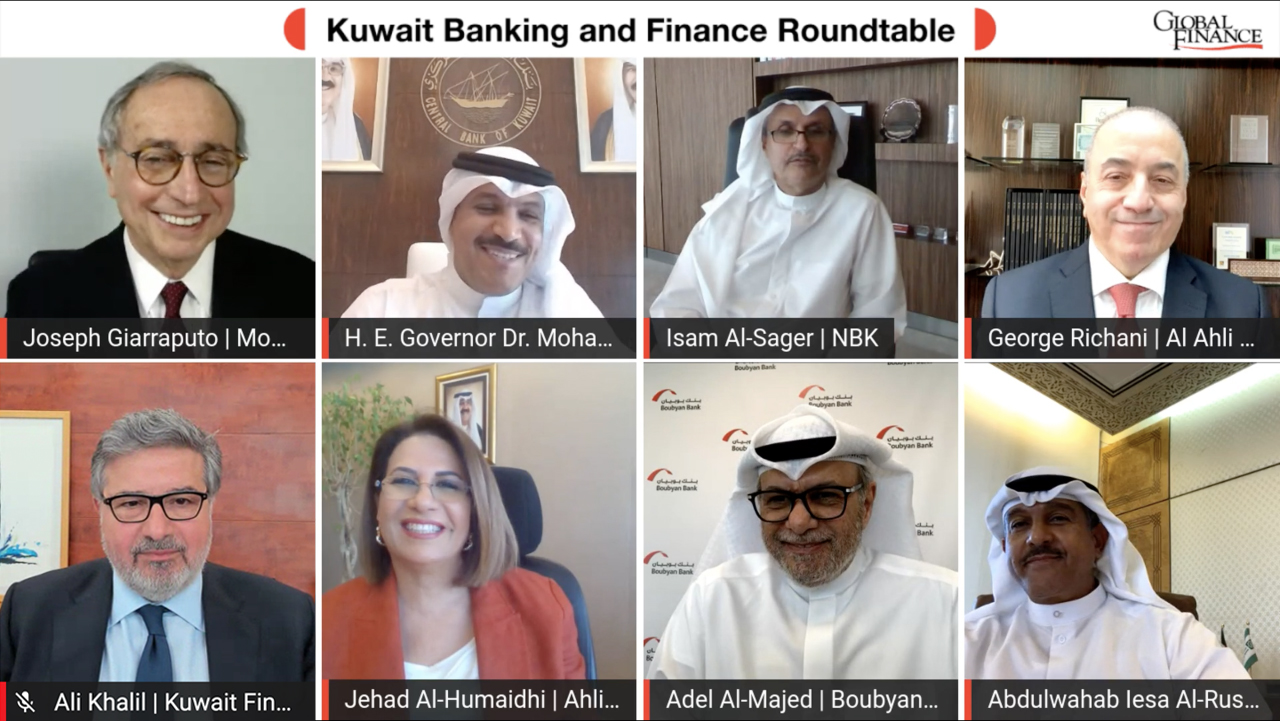
Mr. Ali H. Khalil, CEO of Kuwait Financial Centre “Markaz”, participated as a speaker at the ‘Kuwait Banking and Finance’ virtual roundtable, organized by the Global Finance magazine on Tuesday, 23 March 2021. The roundtable gathered several prominent speakers and experts from the banking sector including Dr. Mohammad Y. Al-Hashel, the governor of the Central Bank of Kuwait and leading Kuwait banks’ Chief Executive Officers to discuss the impact of the pandemic on Kuwait’s economy, the transformation of digital banking services, and the country’s economic development plan. Markaz participated as the only non-banking financial institution in the roundtable.
While addressing the roundtable, Mr. Khalil said that the lockdown and mobility restriction measures necessitated by the Covid-19 pandemic led to significant loss of productivity in nearly all sectors including banking, causing profound business and economic implications.
He stated: “Foremost, we see Kuwait business environment have become more inward-looking, providing favorable opportunities for local businesses in leisure, hospitality, education, and healthcare consumers as restrictions on cross-border travel continue. The impact from Covid has been substantial, but much better than what we expected. Overall, if we look at corporate earnings of 2020, those of listed companies were down by approximately 60% year-on-year; with banks earnings lower by 50%. The biggest losers were real estate and financial services, whereas telecom fared reasonably well, declining by 25% only.”
Sharing his thoughts on economic recovery, Mr. Khalil said: “We feel there is a positive tailwind on the recovery for banks, retail with online shopping, Kuwait-centric hospitality and leisure, education, healthcare, technology and enablers will rebound faster, while commercial and residential real estate, general contracting, outbound hospitality, and business hotels will continue to face structural challenges. It is worth noting that, under the guidance of the Central Bank of Kuwait, the Kuwaiti banks played a very supportive role and continued to provide liquidity to most sectors, which has substantially helped the economy during this crisis.”
Speaking of the need for a comprehensive development plan to diversify Kuwait’s economy and spur job growth, Mr. Khalil said that the country could accelerate diversification and benefit from it by promoting the growth of small and medium enterprises (SMEs). However, the environment can be improved to become more conducive for business formation. Demographics is quite a force towards diversification and business formation. The fiscal pressure also will lead to more reliance on privatization; this will be complemented with initiatives to promote job creation for the national work force in that process.
He pointed out: “Non-banks can play a very positive role in the diversification of the economy. The banking system in Kuwait is understandably risk-averse; regulators continue to favor prudence, and are likely to stay the course for as long as assurances on deposits remain in effect. Added to that, interest rate caps drive Kuwaiti banks towards lower-risk borrowers; it just does not pay to take the risk. Well capitalized non-banks financial institutions can venture into higher risk financing such as equity, quasi-equity, and debt financing. For example, private debt funds have ballooned in the developed markets, and substituted banks in funding the private equity and venture capital sectors. Non-banks can also be very helpful under tougher fiscal conditions. We see a built-up of receivables in some sectors. New products, such as factoring, can provide liquidity to these sectors, allowing them to grow, while providing investors in Kuwait with income generating instruments. The long-term mortgages, if properly regulated, can energize the housing industry. Furthermore, if mortgages were to be securitized, they can provide investors in Kuwait with instruments to invest in.”
In conclusion, Mr. Khalil said that “diversification requires a holistic policy, starting with talent building, legislations, regulation, and financing all working in concert. In that equation, the banking sector is way ahead of the other sectors, and non-banks can bridge the gap in risk-taking.”

